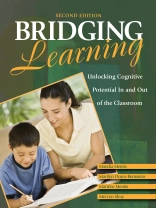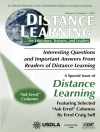‘This book seamlessly blends theory with practical, real-life applications and activities that can be completed quickly and easily in both school and home/community settings. This encourages a partnership between all stakeholders to help students succeed.’
—Betty Brandenburg Yundt, Sixth-Grade Teacher, Curriculum Coordinator
Walker Intermediate School, Fort Knox, KY
‘Using real-world examples and applications, this book makes cognitive psychology and cognitive education accessible to all who work with children and other learners. I immediately felt more confident in applying my new thinking and understanding to my practice.’
—Wendy Holley, School Psychologist
Bend-La Pine School District, OR
Develop lifelong learners by promoting effective thinking skills in school and beyond!
Based on Instrumental Enrichment (IE), a cognitive education approach pioneered by internationally renowned psychologist and child development expert Reuven Feuerstein, this updated volume provides practitioners with much-needed techniques to develop students′ thinking skills and ‘bridge’ these skills to the home and community.
This user-friendly book outlines fourteen core thinking skills that increase students′ cognitive capacity, including organization, comparison, categorization, and problem solving. The authors demonstrate how teachers can mediate learning in the classroom and help parents, social workers, counselors, and other adults who work with youth to extend learning beyond the classroom. Each chapter features:
- An introduction to and description of a specific skill
- Examples and applications for formal and informal learning contexts
- An outline of how the skill aligns with Feuerstein′s theories of Mediated Learning and Cognitive Modifiability
Expanded to include an overview of many IE-related research studies and quotes to stimulate reflection on each skill, this second edition of Bridging Learning is a dynamic resource for creative educators dedicated to enhancing thinking skills in all learners.
विषयसूची
Preface
Acknowledgments
About the Authors
Introduction
1. Organization
Organization: What, Why, When, and Where?
Bridging Organization to Formal Learning Concepts
Bridging Organization to Informal Learning Concepts
Application of Organization: Energy Efforts
Feuerstein′s Theory in Mediating Organization
2. Comparisons
Comparisons: What, Why, When, and Where?
Bridging Comparisons to Formal Learning Contexts
Bridging Comparisons to Informal Learning Contexts
Application of Comparison: Cyber Counseling
Feuerstein′s Theory in Mediating Comparison
3. Categorization
Categorization: What, Why, When, and Where?
Bridging Categorization to Formal Learning Contexts
Bridging Categorization to Informal Learning Contexts
Application of Categorization: Toys and Tots
Feuerstein′s Theory in Mediating Categorization
4. Relational Orientation in Space
Relational Orientation in Space: What, Why, When, and Where?
Bridging Relational Orientation in Space to Formal Learning Contexts
Bridging Relational Orientation in Space to Informal Learning Contexts
Application of Relational Orientation in Space: Family Feuds
Feuerstein′s Theory in Mediating Relational Orientation in Space
5. Cardinal Orientation in Space
Cardinal Orientation in Space: What, Why, When, and Where?
Bridging Cardinal Orientation in Space to Formal Learning Contexts
Bridging Cardinal Orientation in Space to Informal Learning Contexts
Application of Cardinal Orientation in Space: Cultural Compass
Feuerstein′s Theory in Mediating Cardinal Orientation in Space
6. Analysis and Synthesis
Analysis and Synthesis: What, Why, When, and Where?
Bridging Analysis and Synthesis to Formal Learning Contexts
Bridging Analysis and Synthesis to Informal Learning Contexts
Application of Analysis and Synthesis: Think Global, Act Local
Feuerstein′s Theory in Mediating Analysis and Synthesis
7. Problem Solving
Problem Solving: What, Why, When, and Where?
Bridging Problem Solving to Formal Learning Contexts
Bridging Problem Solving to Informal Learning Contexts
Application of Problem Solving: Cyber Bullies and Suicide Scripts
Feuerstein′s Theory in Mediating Problem Solving
8. Relationships
Relationships: What, Why, When, and Where?
Bridging Relationships to Formal Learning Contexts
Bridging Relationships to Formal Learning Contexts
Application of Relationships: Relatives and Relations
Feuerstein′s Theory in Mediating Relationships
9. Temporal Concepts
Temporal Concepts: What, Why, When, and Where?
Bridging Temporal Concepts to Formal Learning Contexts
Bridging Temporal Concepts to Informal Learning Contexts
Application of Temporal Concepts: Slow and Steady
Feuerstein′s Theory in Mediating Temporal Concepts
10. Instructions
Instructions: What, Why, When, and Where?
Bridging Instructions to Formal Learning Contexts
Bridging Instructions to Informal Learning Contexts
Application of Instructions: Implied Instruction
Feuerstein′s Theory in Mediating Instructions
11. Progressions
Progressions: What, Why, When, and Where?
Bridging Progressions to Formal Learning Contexts
Bridging Progressions to Informal Learning Contexts
Application of Progressions: Cultural Constants and Continuities
Feuerstein′s Theory in Mediating Progressions
12. Transitive Relations
Transitive Relations: What, Why, When, and Where?
Bridging Transitive Relations to Formal Learning Contexts
Bridging Transitive Relations to Informal Learning Contexts
Application of Transitive Relations: Global Greed
Feuerstein′s Theory in Mediating Transitive Relations
13. Syllogisms
Syllogisms: What, Why, When, and Where?
Bridging Syllogisms to Formal Learning Contexts
Bridging Syllogisms to Informal Learning Contexts
Application of Syllogisms: Silly Syllogism
Feuerstein′s Theory in Mediating Syllogisms
14. Scaffolding
Scaffolding: What, Why, When, and Where?
Bridging Scaffolding to Formal Learning Contexts
Bridging Scaffolding to Informal Learning Contexts
Application of Scaffolding: Project Planning
Feuerstein′s Theory in Mediating Scaffolding
Appendix A: 12 Criteria of a Mediated Learning Experience (MLE)
Appendix B: Cognitive Functions and Dysfunctions
Appendix C: Cognitive Map
Glossary
References
Index
लेखक के बारे में
Martene Mentis has twenty years of experience in education and has taught at primary, secondary, and tertiary levels. Her diverse educational background includes 6 years with the Cognitive Research Centre, University of the Witwatersrand, South Africa, where she contributed to research, lectured in Instrumental Enrichment (FIE) workshops, and helped develop educational resources, including two books on Mediated Learning and Instrumental Enrichment. She completed her training in FIE under Reuven Feuerstein, at the International Centre for Learning Enhancement in Israel, and in the Learning Potential Assessment Device (LPAD) at the Cognitive Research Centre in South Africa. She has an honours degree in fine arts and a master′s degree in education. She currently is an independent scholar, artist, and illustrator, working as an art educator and graphic designer in New Zealand.












